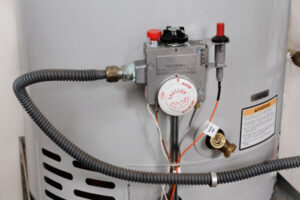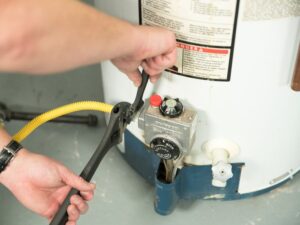How to Handle Gas Water Heater Repair Safely
It might sound easy to fix a gas water heater, but you have to be very careful because you will be working with gas lines, fires, and heated water. If your gas water heater is making noises, having trouble staying lit, or the water temperature changing, learning how to fix and maintain it properly can keep you safe and make it last longer.
This piece will talk about safe ways to fix things, common issues, skilled vs. do-it-yourself repairs, and important maintenance tips.
Why Gas Water Heater Repair Matters
Gas water heaters are a safe way for homes to get hot water, but they need to be serviced regularly. Untreated gas leaks, carbon monoxide dangers, and silt accumulation can cause costly crashes.
The U.S. Department of Energy says that heating water uses about 20% of all the energy that homes use. For this reason, it is crucial to prioritize safety and efficiency.

Common Issues with Gas Water Heaters
Before you try to fix a gas water heater, here are some things you should know:
- Pilot Light Issues: The thermocouple may need to be fixed or replaced if the light goes out a lot.
- Sounds Like Shaking or Popping: It sounds like the tank is shaking or popping.
- No Hot Water: The stove, gas line, or thermostat might be broken.
- Leaks Around the Tank: There could be rust, weak links, or too much pull.
- Gas Smell: Are telling you that you need to get help right away.
If you smell gas, leave right away and call the gas service company in your area. You shouldn’t try to fix things yourself.
Safety Precautions Before Any Repair
Before you start fixing your gas water heater, do these things because working with gas is dangerous:
- Turn Off the Gas: Turn off the gas valve to stop leaks.
- Flip the Switch: For heaters with electric parts, turn the switch to “off.”
- Allow Cooling Time: It’s dangerous to work on hot water tanks right away; let the system cool down first.
- Ventilate the Area: Make sure air can flow well so gas doesn’t build up.
- Use Protective Gear: Gloves, goggles, and a mask keep you safe from dust and burns.
Gas Water Heater Repair Basics
Here’s an easy way to fix problems yourself (only for small ones):
1. Pilot Light Troubleshooting
- Take off the cover and look at the flame.
- A soft brush can be used to clean the flame and pilot mechanism.
- To change a thermocouple that is broken, follow the instructions that came with it.
2. Flushing the Tank
Buildup of sediment makes things less effective. Learning how to flush a water heater makes it work better and last longer.
3. Checking Gas Connections
- Put a mix of soap and water on the fittings.
- Look for bubbles. They mean there is a gas leak. Call a professional right away.
4. Replacing the Anode Rod
Inside the tank, the anode bar keeps rust from building up. If more than 75% of it is rusted, check it out and replace it.
5. Adjusting the Thermostat
- To be safe and get the best results, Put it somewhere between 120°F and 140°F.
- Lower levels save energy and lower the risk of getting burned.
When to Call a Professional
You shouldn’t fix all of your gas water heater problems by yourself. For help, call a plumber or technician if you see any of these signs:
- A strong gas smell.
- There is water under the heater.
- The burner mechanism doesn’t work right.
- Carbon monoxide detectors sound the alarm.
- Major leaks or rust in the tank.
Check out this full guide on how much it costs to install a water heater for big jobs or to repair an old one.

Preventive Maintenance Tips
Repairs are less likely to need to be made when frequent care is done:
- Do a portable water heater flush or a tankless flush once a year.
- Every 6 to 12 months, check and clean the burners.
- Check to see if the pressure release valve works right.
- You can add an overflow tank to your water heater to protect it from damage caused by too much pressure.
- A professional should look at it once a year.
Compare other choices, like a heat pump water heater to a movable system, to find ways to save even more energy.
Conclusion
Gas water heater repair needs to be a careful mix of skill and safety. You can do things like flush the toilet or change the temperature in your home. But gas leaks, burner systems, and other hard parts should only be worked on by pros.
Take good care of your gas water heater, follow safety rules, and have a professional check it out every so often. It’s safe and will give you hot water for years.
FAQs For Gas water heater repair
Q1. Can I fix my gas water heater myself?
Simple operations, such as re-enabling the starting light, may be safe if performed in accordance with the manufacturer’s instructions. Repairing gas pipes and switches, however, requires special training.
Q2. How can I tell if I need to fix my gas water heater?
There are often signs like things that don’t make sense, the smell of gas, or a pilot light that keeps going out.
Q3. How often should I do maintenance on my gas water heater?
It is essential to perform this annually to ensure your gas water heater remains safe and operational. Fix things regularly to avoid costly failures.
Q4. What should I do if I smell gas near my water heater?
Immediately turn off the gas, ensure that air circulates in the area, and then contact your gas company or a plumber. Don’t try to fix things on your own in this case.
Q5. Is it possible to make my gas water heater last longer by maintaining it?
Without a doubt. In order to guarantee that the heater continues to function at its best and that it will last for a long time, It is important to clean the tank often in order to inspect the anode rod, and to examine the gas components.